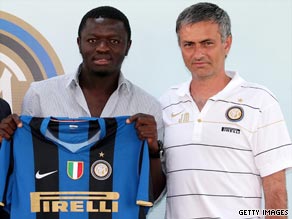Is it right to drop a fasting footballer?
- Story Highlights
- Jose Mourinho substituted Sulley Muntari because he had been low energy
- The Ghanaian midfielder is a Muslim and had been fasting during Ramadan
- Egypt's national youth team turned down the opportunity to break the fast
- Let us know if fasting footballers should dropped in the Sound Off below
(CNN) -- Portuguese football coach Jose Mourinho, ever the headline creator, has caused further outcry this week after he substituted Ghanaian midfielder Sulley Muntari from his Inter Milan side during their Italian Serie A clash with Bari.

Inter midfielder Sulley Muntari was substitued Jose Mourinho for his low-energy levels as a result of fasting.
Taking a tired player from the field of play was hardly breaking news, at least it wasn't until Mourinho revealed the move had been prompted because the player's perceived "low-energy levels" were as a result of fasting.
Muntari is a practicing Muslim who, like many of the same faith around the world, is currently not eating during the hours of daylight to mark the Ramadan holy period .Should fasting footballers be dropped by their managers? Sound Off below.
A discipline that clearly irked Mourinho who said in a post-match press conference: "Muntari had some problems related to Ramadan, perhaps with this heat it's not good for him to be doing this (fasting). Ramadan has not arrived at the ideal moment for a player to play a football match."
Muslim leaders in Italy have criticized the opinions of the coach known as the "Special One", but Mourinho did not rule out the possibility of dropping the player for the Milan derby between arch rivals Inter Milan and AC Milan this weekend for the same reason.
![]() Click here to see our gallery of the top 10 Muslim football stars »
Click here to see our gallery of the top 10 Muslim football stars »
Elsewhere in Italy, fellow Muslim and Siena striker Abdelkader Ghezzal added to the debate by revealing he cannot fast and play at the same time.
"I've always observed Ramadan but I have had to change my habits for health reasons from the first year that I became a professional. Before that I played at Crotone [while fasting] but after two weeks I felt ill and had to stop."
Egypt's Under-20 football squad passed up the chance to break the Ramadan fast to help them prepare for the forthcoming World Youth Championship which they host at the end of September.
Don't Miss
The Egyptian Football Association confirmed that the Dar al-Ifta, the country's institution which clarifies religious principles and issues edicts, had given specific permission for the players to legitimately avoid fasting.
It is not just Ramadan which has caused issues between Muslim players and their clubs.
The beliefs of Sevilla striker Freddie Kanoute have conflicted with the demands of his professional career.
Kanoute taped over the logo of the Sevilla club's shirt sponsors - internet gaming company 888.com -- in 2006 because he said Islam forbade the promotion of gambling.
So is Mourinho right to take account of how religious practices may affect his players' performance? Is it wrong to drop a fasting footballer whose energy levels may be lower than his teammates?

Should Mourinho contemplate that a player of faith may perform better in a period of self-enforced discipline? Were the Egyptian players right to carry on fasting even though they were given permission to break the fast?
If Kanoute right to bring his religious beliefs into his place of work? And can sport and religion ever be separated in a satisfactory way?Let us know your thoughts in the Sound Off box below.
All About FC Internazionale Milano • Jose Mourinho • José Mourinho • European Football • Football • Freddy Kanoute • Frederic Kanoute • Egypt
 Sit tight, we're getting to the good stuff
Sit tight, we're getting to the good stuff
